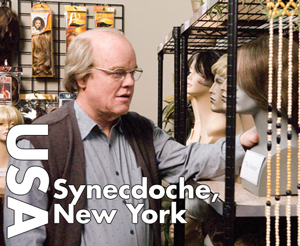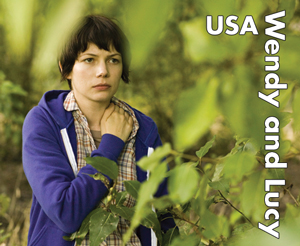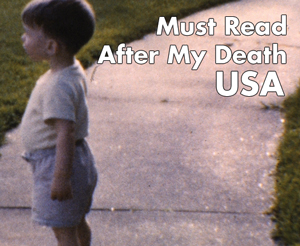CIFF: Synecdoche, New York; Wendy and Lucy; Must Read After My Death
By Rob Christopher in Arts & Entertainment on Oct 14, 2008 7:05PM
 This is part of Chicagoist's coverage of the Chicago International Film Festival.
This is part of Chicagoist's coverage of the Chicago International Film Festival.
Synecdoche, New York (screens 10/19)
Imagine that you're a character inside The Truman Show, and in the course of your daily life you keep getting little glimpses of what you think might be the world outside the show. But you can't be sure. That's what it's like to watch Synecdoche, New York, the directorial debut of screenwriter Charlie Kaufman (Being John Malkovich, Eternal Sunshine of the Spotless Mind). Philip Seymour Hoffman, in a characteristically tour de force performance, plays an acclaimed theatre director who suddenly begins suffering from a variety of strange health problems. The diagnosis, we're led to believe, is Kafkaesque malaise; the projected end result is (of course) death. When he wins a MacArthur genius grant he decides to address humankind's mortality head on with an enormous theater piece, one that involves the recreation of his entire environment inside a massive warehouse. And then he starts casting actors to play the people in his own life, which naturally includes casting actors to play the actors ... and that's when things really get strange. Kaufman's film is a deliberately off-putting exercise that bends the usual cinematic notions of time and reality into four-dimensional pretzels. It's also hilarious. And the astonishing thing is that, despite the nonstop surreality, the characters at its core are somehow believable as real people. Catherine Keener, Michelle Williams, Dianne Wiest and Samantha Morton all contribute strong performances. Although the last third grows a bit leaden and talky, Kaufman knows when to throw in another poop joke to break the tension. The final sequence is as inexplicably cathartic as the ending of INLAND EMPIRE. This is an aggressively intelligent and bizarre puzzlebox comedy that'll have you questioning the nature of reality as you exit the theater.
By the way, it's pronounced /si-nek-duh-kee/.
 Wendy and Lucy (screens 10/17 and 10/18)
Wendy and Lucy (screens 10/17 and 10/18)
Wendy is a young woman traveling alone cross-country from Indiana to Alaska to work in the canneries. Lucy is her dog, and closest friend. While on a pit stop in Oregon, Wendy makes the mistake of shoplifting. When she's caught and then Lucy goes missing, her plans are thrown into turmoil. She's no longer able to keep the world at arm's length, and the film follows her as she's forced to interact with strangers in order to try and salvage her trip. This is a simple, heartbreaking story about loneliness centered on an outstanding performance by Michelle Williams and a painterly eye for the environs of Oregon. Anyone who's ever spent time in the Pacific Northwest will savor details like the greeness of the grass in an empty field or the slow clatter of a freight train going by. It's a small gem that has all the Americana of a John Ford movie yet recalls the naturalism of Vagabond and even Umberto D. And like those movies this is about people literally living hand to mouth, an existence where a gift of $6 (which occurs towards the end) is truly a sacrifice. At only 80 minutes long, the movie's patient, almost languid pace recalls a perfectly constructed short story.
 Must Read After My Death (screens 10/21 and 10/22)
Must Read After My Death (screens 10/21 and 10/22)
Spellbinding, voyeuristic and frequently disturbing, Morgan Dews' documentary is almost entirely composed of archival material left behind by his grandmother Allis after her death. The mosaic that emerges is not one of the stereotypical white suburban family of 50's and 60's America. Instead it's an indictment of our society's whitewashed memories of that time. Following Allis's lead the family dedicated itself to documenting itself, using dictaphone "letters," reel-to-reel tape recordings (of monologues and family meetings), home movies and snapshots. Not only did Allis and her husband Charlie seem to have existed in some sort of open marriage for a time, but all four of their children eventually went into psychiatric analysis. Both parents inevitably blamed themselves. The era's built-in repression and a number of psychiatrists over the years only made things worse. "Dr. Lynn says that when a man marries, he wants a woman with a capital W ... I have not been a woman with a capital W," says Allis on one of her recordings, her voice cracking. Dews slows down the vintage footage to hypnotic effect, birthday parties and Christmas mornings and boy scout gatherings, allowing us to soak up the resonance of each film grain. However he also insists on subtitling the entire soundtrack, a largely unnecessary attempt at clarification that nearly spoils the film. Reading words that in most cases are clearly audible adds a distracting layer that distances us from the real people onscreen. Quibble aside this is still a must-see.